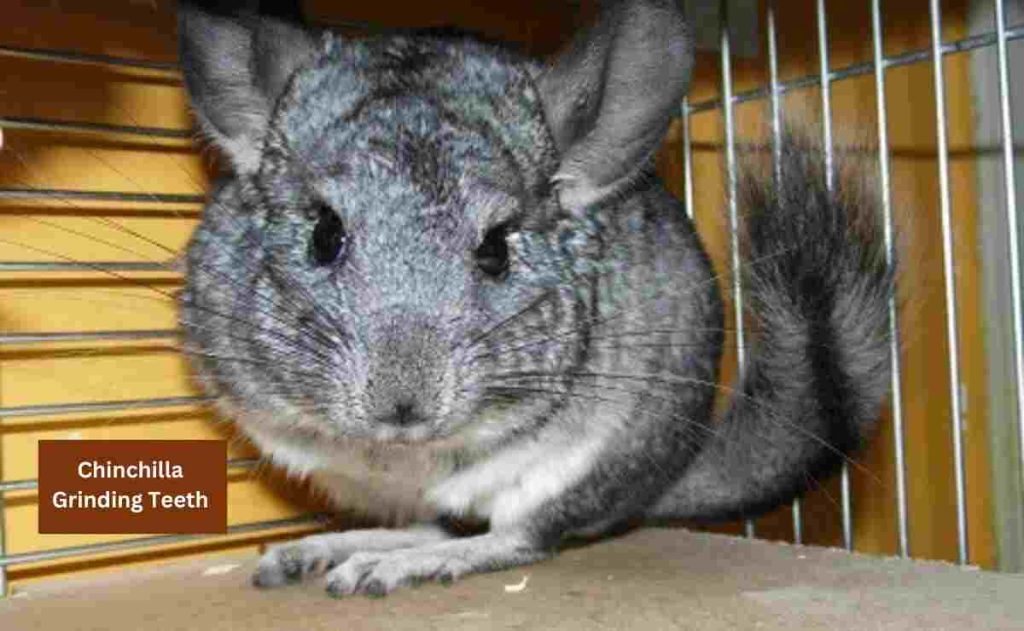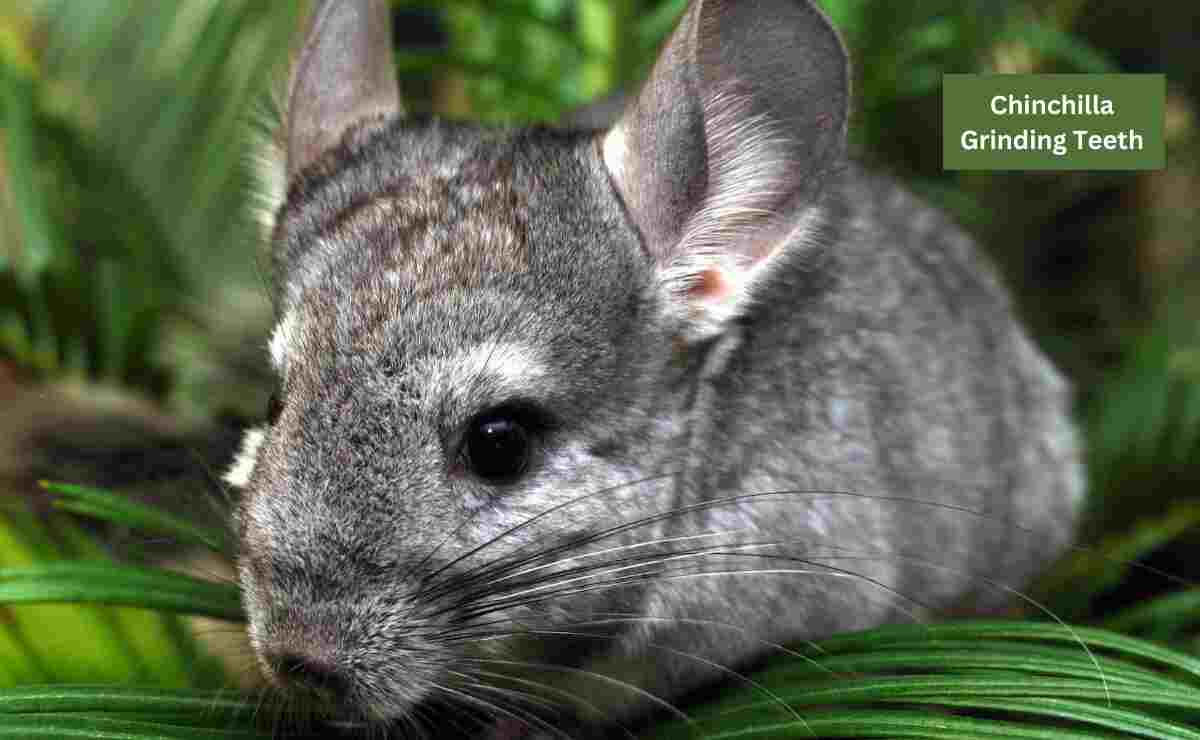If you are a chinchilla owner, you must observe chinchillas grind their teeth from time to time. Their teeth grow continuously throughout their lifetime, so don’t worry about it. Chinchilla grinding teeth is a natural way for them to wear down their teeth and keep them at the proper length. This behavior is also known as bruxing.
Most of the time, teeth grinding is nothing serious for chinchillas. But sometimes, it can be an indication of an underlying issue. Keep reading on to find the reasons for chinchilla teeth grinding.
What is chinchilla teeth grinding?
Teeth grinding is a common behavior that you can notice in chinchillas. This action involves the grinding or chattering of the teeth and you can hear some weird noise or it remains silent.
Unlike humans, chinchillas don’t have a predetermined tooth length; instead, their teeth are in a perpetual state of growth. Teeth grinding serves as a natural mechanism employed by chinchillas to maintain optimal dental health by preventing overgrowth.
So, the next time you hear the gentle hum of your chinchilla’s teeth, appreciate it as a sign of their innate dental care routine.
Chinchilla Grinding Teeth – Why It Is Necessary?

Chinchillas are the members of the rodent family who all have long and sharp incisors that never take a break from growing. Chinchillas have both the upper and lower mandible house two pairs of long incisors, often referred to as front teeth. Behind these incisors lie premolars and molars, collectively known as “cheek teeth,” separated by a gap called diastema.
Since chinchillas contain open-rooted teeth that continue to grow and it can be an average of 2 to 3 inches every year. Maintaining an even gnawing rate is important because overgrown teeth can lead to serious dental conditions.
Overgrown teeth are bent and poked out between chinchilla lips and it can cause serious cuts. The teeth also stuck with things, become obstacles while eating, and the molars overgrow too. Sharp-edged molars that cause sores inside the chinchilla’s gums and cheeks. Now, that’s not something we want for your furry friends.
Chinchillas grind their teeth to maintain the health of their teeth. Grinding their teeth helps to prevent various dental issues. Fear not, though, for there are many other ways to keep your chinchilla’s teeth at a proper length.
Major Reasons For Chinchilla Tooth Grinding
Not all teeth grinding in chinchillas are healthy or normal. Excessive teeth grinding, accompanied by other symptoms such as loss of appetite, drooling, or weight loss, may indicate an underlying dental problem or illness. Here are some reasons:
Stress
Stress is the primary cause of chinchilla tooth grinding. Many situations can trigger stress in chinchillas. Changes in the environment, such as bringing your chinchilla home for the first time or relocating its cage, can trigger this reaction.
Chinchillas are sensitive to their surroundings. If stress is the culprit, comfort your chinchilla by interacting with it in a calm manner. Allow it time to adapt, providing frequent opportunities to explore the new environment.
Consider a chinchilla playpen to create a smaller, safe space for interaction. This helps build a bond faster, making your chinchilla more comfortable and potentially reducing stress-induced tooth grinding.
Illness, Pain or Discomfort
Sometimes, tooth grinding signals an underlying health issue. It can be tooth-related or not. Overgrown teeth, if not filed down naturally through chewing, can lead to this behavior. Offering chinchilla-safe toys for chewing is crucial, but if your chinchilla isn’t grinding its teeth, it’s time to be proactive.
Ensure your chinchilla has access to safe toys for chewing, and stay vigilant for signs of illness. Regular veterinary check-ups can help catch potential issues early on.
Boredom
Surprisingly, boredom can drive chinchillas to grind their teeth. If there’s no apparent cause, it might be time to add some excitement to your chinchilla’s life. Consider getting a chinchilla mate for interaction or spending more quality time with your pet.
Chinchillas are not dangerous rather the are social animals, and spending more time with them or providing a larger cage for activity can combat boredom-induced tooth grinding.
Communicating
Sometimes, tooth grinding is your chinchilla’s way of communicating. It might indicate annoyance during specific interactions like being held when it prefers exploring.
Let your chinchilla have its designated playtime, allowing it to engage in natural behaviors without interference. Recognizing and respecting your chinchilla’s communication cues will strengthen your bond over time.
How To Know What Is Causing Your Chinchilla To Grind Its Teeth?
Unfortunately, it is not easy to find out why your chinchilla grind teeth. It requires closer observation of its behaviors and body language.
Pain Indication
If your chinchilla is grinding its teeth while holding its ears back and adopting a hunched posture, this is a clear sign of discomfort or pain. In such instances, you should find out potential health issues promptly. A visit to the vet is recommended to identify and alleviate any pain of your chinchilla.
Positive Grind
If your chinchilla is grinding its teeth while displaying active behaviors like popcorning and running around, it indicates a positive state of mind. In this scenario, the teeth-grinding aligns with contentment and happiness. It’s a testament to your chinchilla’s well-being and enjoyment.
Health Alert
When your chinchilla exhibits teeth grinding along with symptoms of illness, such as a runny nose, lethargy, or abnormal behaviors, it’s a red flag for potential health issues. In such cases, seeking veterinary attention promptly is crucial to diagnosis.
Chinchilla Quirks
Chinchillas are known for their quirky behaviors that might not always align with our human understanding. If your chinchilla seems to be grinding its teeth for no apparent reason, it could be one of those whimsical moments. Chinchillas often engage in activities that might not have an immediate explanation.
What To Do To Stop Your Chinchilla Grinding Teeth?
If your chinchilla is grinding its teeth excessively, you should consult a vet for a thorough examination. The vet can pinpoint the root cause of the teeth grinding and formulate an appropriate treatment plan. Whether it’s stress, anxiety, or dental problems, professional guidance is crucial.
Identifying and addressing stress or anxiety triggers is key to mitigating teeth grinding. If it is for stress or anxiety, you should create a calm environment for your chinchilla, and minimize loud noises and sudden movements. Spend quality time with them, and offer reassurance and companionship.
If dental problems are the culprit, your vet may need to trim the chinchilla’s teeth or suggest dental treatment. Regular veterinary check-ups are essential for identifying and addressing dental issues before they escalate.
To prevent chinchilla’s teeth grinding, you can take some simple steps:
- Ensure your chinchilla’s diet is healthy and well-balanced, including plenty of hay. It serves as a vital component for dental health, helping wear down their teeth naturally.
- Provide an array of chinchilla-safe chew toys. Chinchillas have a natural instinct to chew, and offering appropriate items helps maintain dental health by preventing overgrowth.
- Schedule routine check-ups with the vet to monitor your chinchilla’s overall health, including dental well-being. Early detection of potential issues can prevent severe complications.
Final Words
Teeth grinding in chinchillas is a natural behavior that helps them keep their teeth healthy and at the correct length. It can also serve as a form of communication. However, it is essential to monitor your chinchilla for any signs of abnormal teeth grinding.
To promote healthy teeth grinding in your chinchilla, provide them with appropriate chew toys or blocks made specifically for chinchillas. These items help to naturally wear down their teeth and satisfy their instinctive need to chew. Seek veterinary help if you can’t figure it out.
